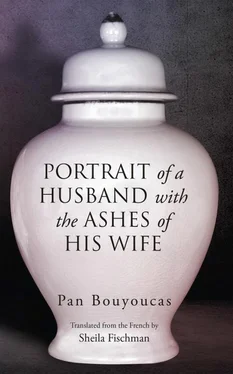A homily was delivered by the officiant, followed by tributes. The first was from Zak. He had never seen Alma act in the theatre, only on television, yet he called her a great tragedian, because, he said, even as a child her back was always erect when she cried.
“Today though she is singing. Do you hear her?” he asked, pricking his ear towards the huge maple trees that surrounded the church, their dense foliage full of birds. “That chirping is Alma telling us she loves us and asking those who love her not to hold her back with sad thoughts because it is with an infinite joy that she is continuing on the road that leads to the Creator.”
Carmen, who wasn’t very fond of her brother, whispered into the ear of Doctor Maras:
“So the hypocrite speaks with the dead now, does he?”
Carmen would have liked her brother-in-law to speak in the name of the family, but all Doctor Maras would have said in public could be summed up in one sentence: She was my sun. Before that even crossed his mind he was rejecting it, because he still had another sun, his daughter, and he wasn’t going to go into lengthy explanations, he who was never long-winded and had always expressed his love better with actions than with words. And so he let the others celebrate Alma. It was perhaps the last time they would think about her whereas he would have her in his thoughts every day.
After Zak, Pauline Brunet, artistic director of the Théâtre Orphée, spoke about her friendship with the dead woman since their student days at the National Theatre School, then about Alma’s contribution to Quebec theatre. She also mentioned some of her accomplishments and concluded by uttering the line that every night made the audience shiver when Alma proclaimed it with her deep voice before the curtain fell on The House of Bernarda Alba :
And no tears. Death must be stared at straight in the face. Silence! Do you hear? Silence, silence, I say! Silence!
Those words took Doctor Maras right back to the moment when he had heard them for the first time, in their house. When she was memorizing a text Alma would sometimes repeat the lines while going about other business. Sometimes too she would ask her husband to give her her cues. At first he stammered, but with time he had gained confidence, sometimes letting himself get carried away by emotion, especially when there were rhymes.
No, you detest me now; and your deep art
Fears to owe a thing to my fond heart.
He had spoken those words by Racine with such ferocity that Alma had laughed so hard he could see her tonsils.
Today, while actors and actresses were singing Alma’s praises, one with an anecdote, another reading lines from one of the characters she had played, Doctor Maras, thinking back to the past, told himself: “Never again will I give her cues, never again will I hear her wonderful laughter in the house.”
 4
4 
AT THE RECEPTIONfollowing the religious service, when Zak learned what Doctor Maras intended to do with Alma’s ashes, he told him:
“You’re right to want to leave them in a garden. My sister adored gardens and the mere scent of freshly-mown grass would make her heart race. But the garden that Alma liked best is the one you had in Saint-Hilaire. Her Montreal garden was more a consolation than a pleasure because these last years both her work and her health experienced only lows.”
The house in Saint-Hilaire was the first one Alma and her husband had lived in. Subsequently they had sold it to Zak because Doctor Maras, who had grown up in a densely populated part of Montreal, couldn’t get used to the suburbs. Which was why Zak went on to say:
“On the other hand, when you were living in Saint-Hilaire, her career was at its peak, she was young and so much in love that she held your hand even when you were on your bikes. It was there too that she became a mother and in that garden that she saw her child take her first steps. The house isn’t yours any more but it doesn’t belong to strangers. It belongs to her brother. I will put in a beautiful corner for her in the garden, and you and Mélissa will be able to come and visit her as often as you want and observe the changing seasons with her, as she loved to do when she was alive.”
Hearing that, Carmen told her brother:
“Alma chose to live in Saint-Hilaire because the open spaces, the orchards, and the wooded hills all reminded her of the countryside at La Malbaie where she’d spent the most wonderful moments of her life when she was a child.”
“You’ve got a hell of a nerve,” Zak said, “to claim today of all days that Alma wasn’t happy with her husband and their child.”
“That’s not what I said,” Carmen replied. “Anyway, if Alma was happiest with Alexandre and Mélissa, why do you want her ashes at your place?”
“I just explained why!” her brother said.
Those two couldn’t abide each other at all and they were about to resume their name-calling when Pauline Brunet interrupted:
“You two obviously didn’t know your sister very well or you’d realize that she was happiest when she was working. That was where she found meaning and justification for her life: on a stage, in her dressing room, in the wings, backstage. It was that environment with its smells, its commotion, its lights that brought her the greatest satisfaction. So much so that she gambled her health on Bernarda Alba rather than stay at home observing the changing seasons, watering plants and talking to them. Listening to you one would think you never saw her on stage. You probably never did, or you’d have known that Alma never wept, neither with her back erect nor bent double nor lying down. Alma wasn’t one of those pathetic actresses who make up their eyes with glycerine as if talent were measured by the quantity of tears an actor can shed.”
“I live too far from Montreal to come to evening performances,” Zak said.
“I don’t like dramas and tragedies,” Carmen said. “But I’ve seen all the comedies Alma performed in, in Quebec City, Chicoutimi, and La Malbaie. And the theatre in La Malbaie is a stone’s throw from her childhood garden.”
“What?!” Pauline Brunet said, with the contempt of the director of a repertory theatre for light comedy. “You want to scatter the ashes of a great actress like her in a summer theatre?”
“Certainly,” Carmen replied. “And I have proof that it’s what my sister would have wanted.”
Then she left, promising her brother-in-law that she would send him the next day, special delivery, irrefutable evidence that Alma would have wanted her ashes buried at La Malbaie.
Zak left the reception two minutes later, saying he was going to draw the monument that he would erect in his garden to receive the ashes of his favourite sister.
Pauline Brunet also hastened to leave, to convene the board of the Orphée and discuss with its members the best way that her theatre could honour the ashes of Alma Joncas.
 5
5 
DOCTOR MARAS WASa man who once he had taken on a task also took on all its demands, all its repercussions. But the task had to be clear, for he loathed anything vague, anything confused. And so he spent the rest of the day and a considerable part of the night turning the pages of the past in search of a word, a phrase, or an anecdote that would have dispelled the doubt that Zak, Carmen, and Pauline Brunet had sowed in his mind. Conscientious and meticulous, he read the reviews in the press devoted to his wife and listened to recordings of interviews she’d given on radio and television.
Читать дальше

 4
4 











